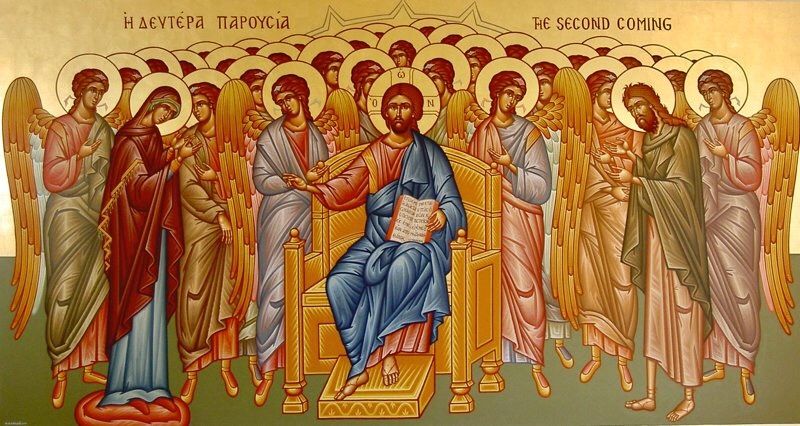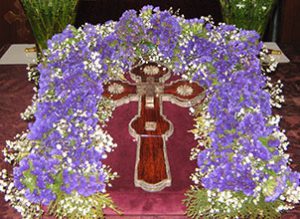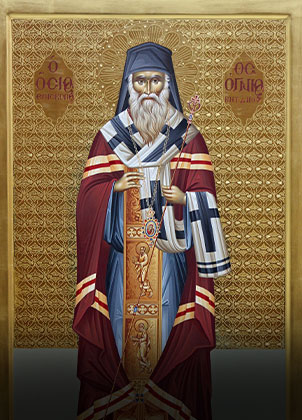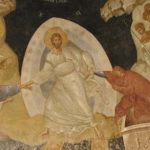Во имя Отца и Сына и Св. Духа.
В сегодяшнем Евангельском чтении мы слышали:
«Не бойся, малое стадо! ибо Отец ваш благоволил дать вам Царство.
Продавайте имения ваши и давайте милостыню. Приготовляйте себе хранилища не ветшающие, сокровище неоскудевающее на небесах, куда вор не приближается и где моль не съедает, ибо где сокровище ваше, там и сердце ваше будет.
Да будут чресла ваши препоясаны и светильники горящи.
И вы будьте подобны людям, ожидающим возвращения господина своего с брака, дабы, когда придет и постучит, тотчас отворить ему.
Блаженны рабы те, которых Господин, придя, найдет бодрствующими; истинно говорю вам, он препояшется и посадит их, и, подходя, станет служить им. И если придет во вторую стражу, и в третью стражу придет, и найдет их так, то блаженны рабы те» (Луки 12,32-38).
Время ночи в библейские времена разделялось на стражи, т.е. промежутки времени, когда сменялись ночные сторожа. В древнейшее время ночь разделялась на три стражи, а в более поздние времена римского владычества, на четыре стражи. Очевидно, Ап. Лука следует более древнему обычаю разделения ночи на три стражи.
Таким образом, вторая и третья стража будет соответствовать середине ночи и времени перед рассветом. Понятно, что бодрствовать в это время ночи особенно трудно, потому что в сон клонит больше всего.
Время нашей жизни уподобляется ночи, которая окончится светлым и нескончаемым днем второго пришествия Христова. Мы молимся словами св. Василия Великого: «И даруй нам бодренным сердцем и трезвенною мыслию всю настоящаго жития нощь прейти, ожидающим пришествия светлаго и явленнаго дне Единороднаго Твоего Сына, Господа и Бога и Спаса нашего Иисуса Христа, в оньже со славою Судия всех приидет, комуждо отдати по делом его».
«Блаженны рабы те, которых Господин, придя, найдет бодрствующими».
Эти слова Господа обращены к тем христианам, которые будут жить во время второго пришествия Христова. Число их будет невелико. Это будет поистине «малое стадо», посреди бесчисленного множества беззаконников. Господь ублажает тех рабов, которых Он найдёт бодрствующими. Что же значит «бодрствовать»?
Ночью люди спят и видят сны. Настоящая жизнь – это сон. Сон может быть приятным или тяжелым, сон может быть очень реальным, но когда мы просыпаемся, мы понимаем, что это был только сон. Так и в последний день нашей жизни, на пороге вечности, мы поймём, что все, что нас так занимало, что казалось таким важным, в действительности, было только сном.
Таким образом, бодрствовать – значит, трезво смотреть на вещи и давать всему истинную цену. Не увлекаться пристрастиями к настоящей жизни, а ожидать пришествия дня Господня. Для этого нужно «иметь наше сердце горѐ ».
Источник деятельности человека находится в сердце. Что мы любим, к тому и стремимся, и готовы на любой труд для достижения своего желания. Потому Господь и говорит: «ибо где сокровище ваше, там и сердце ваше будет».
Невозможно смотреть одним глазом на небо, а другим на землю, так и сердце не может желать Небесного Царства, если оно привязано к земле.Бог даёт нам в неотъемлемое достояния не что-либо другое, как Самого Себя. Но сердце наше неразумно; оставив Бога и Творца, оно привязывается любовью к чему-либо из Его творений.
Каким же образом должны мы ожидать пришествия Христова? Недостаточно только бодрствовать, нужно ещё чтобы наши чресла были препоясаны и светильники горели.
«Да будут чресла ваши препоясаны и светильники горящи».
В древности мужчины, как и женщины, одевались в длинные, свободные одежды. Потому для удобства работы нужно было опоясаться. Мы должны быть деятельными и трудолюбивыми. Горящие светильники изображают постоянную и усердную молитву.
Господь здесь приточно изображает, какими должны быть Его последователи: не привязанными к этому миру, внимательными, обращёнными сердцем к Богу и будущему Небесному Царству, готовыми на всякий труд телесный и духовный для достижения этого Царства, усердными в молитве.
Этот образ перекликается с наставлением Ап. Павла в послании к Римлянам: «духом пламенейте; Господу служите… в молитве будьте постоянны» (Рим. 12, 11-12).
«И если Господин придет во вторую стражу, и в третью стражу придет, и найдет их бодрствующими, то блаженны рабы те».
В первые века христиане жили в ожидании скорого пришествия Христова. Это настроение мы видим и в посланиях Апостолов и в писаниях древних учителей Церкви. Однако, Господь, говоря, что Господин может придти и во 2-ю и даже в 3-ю стражу ночи, прикровенно указывает на то, что Его пришествие не произойдет скоро, вопреки ожиданиям первых христиан.
Однако в наше время , хотя признаки скорого пришествия Христова уже сбылись и сбываются на наших глазах, но в мире все меньше веры во Христа и ожидания дня Господня. День второго пришествия застанет миролюбцев врасплох: «как тать в нощи», по словам св. Ап. Павла (Фесс. 5, 2).
Св. Писание предсказывает, что во время перед пришествием Христовым человечество будет крайне развращено, подобно тому как это было перед Потопом. Потому те, кто смогут уберечь себя от этого развращения и сохранить веру и усердие, получат от Бога великую награду. Аминь.
In the name of the Father, and of the Son and of the Holy Spirit.
In today’s Gospel reading we heard:
“Do not fear, little flock, for it is your Father’s good pleasure to give you the kingdom.” Sell what you have and give alms; provide yourselves money bags which do not grow old, a treasure in the heavens that does not fail, where no thief approaches nor moth destroys.
For where your treasure is, there your heart will be also.
Let your waist be girded and your lamps burning;
And you yourselves be like men who wait for their master, when he will return from the wedding, that when he comes and knocks, they may open to him immediately.
Blessed are those servants whom the master, when he comes, will find watching. Assuredly, I say to you that he will gird himself and have them sit down to eat, and will come and serve them.
And if he should come in the second watch, or come in the third watch, and find them so, blessed are those servants,” (Luke 12:32-38).
In Biblical times, night time was divided into watches i.e. time intervals, when there was a changing of the guard. In more ancient times, night time was divided into three watches, while in later times – during Roman rule – into four watches. Apparently, Apostle Luke followed the ancient custom of dividing night into three watches.
Consequently, the second and third watch would correspond with the middle of the night and the time before sunrise. It’s understandable that to be vigilant at this time of night is especially difficult, because it is during this period the need to sleep is at its greatest.
Our life is likened to night, which will conclude with the bright and timeless day of Christ’s Second Coming. We pray with the words of Saint Basil the Great: “And grant us to pass through the night of the whole present life with watchful heart and sober thought, ever expecting the coming of the bright and appointed day of Thine Only-begotten Son, our Lord and God and Saviour, Jesus Christ, whereon the Judge of all shall come with glory to reward each according to his deeds.”
“Blessed are those servants whom the master, when he comes, will find watching.”
These words are directed to those Christians, who will be living in the times of Christ’s Second Coming. They will not number many. This will be truly a “small flock”, among the countless numbers of the lawless. The Lord glorifies those servants that he found vigilant. At the same time, what does “vigilant” mean?
At night time, people sleep and see dreams. Our present life is a dream. A dream can be either a pleasant or a dark one. It can appear to be very real; but when we awaken, we realise that it was only a dream. Likewise, on the last day of our lives and standing on the threshold of eternity; we will comprehend that all that has occupied our time, which at that time appeared so important, in reality was only a dream.
Thus, “being vigilant” means to look at things in a sober manner and put a true value on everything; not be attached to the present life but await the day of the Lord’s coming. It’s needful to “lift up our hearts”.
The source to a person’s activity is found in the heart. We aspire and strive towards what we love, and are willing to engage in any effort to achieve our desire. That’s why the Lord says: “For where your treasure is, there your heart will be also.”
It’s impossible to have one eye on the heavens and the other on earth. Likewise, a heart cannot desire the Heavenly Kingdom if it’s attached to earth. God gives us, as an inalienable heritage, none other than He Himself. However, our heart is fallacious; in departing from God and Creator, it lovingly attaches itself to one of His creations.
In what manner must we expect Christ’s Coming? It’s insufficient just to be vigilant; it’s also necessary for our loins to be girded and our lamps burning.
Christ says: “Let your waist be girded and your lamps burning”.
In ancient times, men like women dressed in long, loose clothing.
That’s why to work in comfort, one needed to be girded. We must be active and industrious. The burning lamps depict continuous and earnest prayer.
Here, the Lord indicates precisely what they should be in order to be His followers: not to be attached to this world, attentive, directed in heart toward God and to the Heavenly Kingdom, ready and willing to undertake any physical and spiritual labour for attaining this Kingdom, and earnest in prayer.
This image resonates with Apostle Paul’s directive in his Epistle to the Romans: “be fervent in spirit, serving the Lord… continuing steadfastly in prayer.” (Romans 12:11-12).
“And if the Master should come in the second watch, or come in the third watch, and find them watching, blessed are those servants,” (Luke 12:32-38).
In the Early Church, Christians lived in the hope of a quick coming of Christ. And we see this in the Epistles of the Apostles and in the writings of early teachers of the Church. However, in saying that the Master can come in the second, and even in the third watch of the night, our Lord Jesus Christ indicates indirectly that His coming will not occur soon, contrary to the expectations of the early Christians.
However, in our times, although signs of Christ’s rapid Coming have already passed and are passing before our eyes, there is less faith in Christ and expectations of His day. The day of His Second Coming will catch those attached to the world by surprise – in the words of Apostle Paul: “as a thief in the night” (Thes. 5,2).
The Holy Scripture predicts that before the coming of Christ, humanity will be extremely defiled, akin to that before the Great Flood. That is why those who will be able to preserve themselves from this defilement and sustain their faith and zeal will receive a great reward from God.
Amen.









